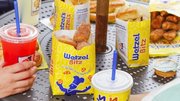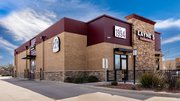Article
QSRs feel economic pinch
As consumers tighten their wallets, operators scale back locations.

February 6, 2008 by Valerie Killifer — senior editor, NetWorld Alliance
While consumers tighten their wallets and analysts weigh in, quick-service restaurant brands are taking action against current economic conditions.
Brands such as Starbucks and Pick Up Stix — plagued by underperforming locations across the United States — are cleaning house in an effort to decrease operating costs.
Starbucks announced Jan. 7 the closing of approximately 100 locations this year, while Pick Up Stix announced in January the shuttering of 26 locations throughout California, Arizona and Nevada.
The industry is experiencing a "perfect storm" of economic issues, said Morningstar analyst John Owens, and casual-dining chains are experiencing the first industry challenges.
According to Wachovia Capital Markets LLC analyst Jeff Omohundro, the casual-dining segment has the weakest position in the macro-environment — aspects of the economy companies can't control, such as wage and food cost increases.
"In our view, the sales growth for the casual-dining segment will likely be constrained in 2008 given ongoing consumer spending pressures and potential trade down to the fast-casual and quick-service sectors," Ohohundro said in a January equity research report. "Additionally, we expect pricing pressures from elevated food and labor costs to challenge casual-dining operators as they may not be able to raise menu prices in a tough spending environment."
While Wachovia lowered its valuation for concepts such as O'Charley's Inc., Brinker International Inc. and Darden Restaurants Inc., it increased to outperform Red Robin Gourmet Burgers and Texas Roadhouse.
In the quick-service category, operators such as CKE Restaurants Inc., Yum! Brands Inc. and McDonald's are working to reduce costs. CKE has put into effect a plan to refranchise a combined 200 Hardee's and Carl's Jr. units, while Yum! is looking to reduce by 10 percent its corporate ownership of locations by 2010.
Even QSR powerhouse McDonald's is feeling the economic strain. Same-store sales in December were flat while fourth-quarter comps increased only 3.3 percent. The company cited winter weather for the December dip along with softer consumer spending.For January 2008, McDonald's has predicted a comps increase of 1.5 percent compared to a gain 3.6 percent a year ago.
"It's a challenging time," he said. "But I think strong brands with good balance sheets and with top-notch management teams are going to weather the storm."
2008 projections
Although the National Restaurant Association has forecasted 2008 industry sales at $558 billion, growth for the industry is moderating, said Hudson Riehle, senior vice president of the National Restaurant Association's research and information services division.
"When we were doing the 2008 forecast, we knew that the first quarter of 2008 was going to be a challenging environment. But, nothing has occurred so far to make us re-evaluate the underlying (estimate)," he said. "The industry really has become much more essential to consumers' daily lifestyles now than any other point in time. Consequently, consumers are reticent to change their frequency patterns as well as alter their lifestyles fundamentally."
Indeed, the industry's overall economic impact is expected to exceed $1.5 trillion this year. And the NRA also is forecasting 945,000 individual restaurant locations across the United States.
Quick-service restaurant sales are forecast to grow to $156.8 billion, according to the NRA, an increase of 4.4 percent over 2007.
| ||||||||||||||||||||||
"The fact is, consumers not only need the industry more, but also have a natural inclination to patronize away-from-home (establishments) because the price-value relationships remain competitive," Riehle said.
QSR's will have to maintain their leadership roles in the price-value category in order to hold onto their market position and customers.
Riehle said because of the tighter economic conditions, consumers have a very distinct impression of the price-value relationship based on prior restaurant experiences.
"If they feel a price is not fair, they are quick to vote with their feet," he said.
Restaurant operators should respond at the national and/or local level to keep and continue brand awareness efforts.
"In softer economic times, a natural inclination is to basically manage costs much more effectively, and that makes sense," Riehle said. "But, in softer economic times, it's important to highlight the proportion of resources that need to be allocated toward marketing, advertising and local messaging that need to be stepped up because the need is there to really act as a catalyst to spur that indecisive consumer toward turning to your brand."
 ChatGPT
ChatGPT Grok
Grok Perplexity
Perplexity Claude
Claude









